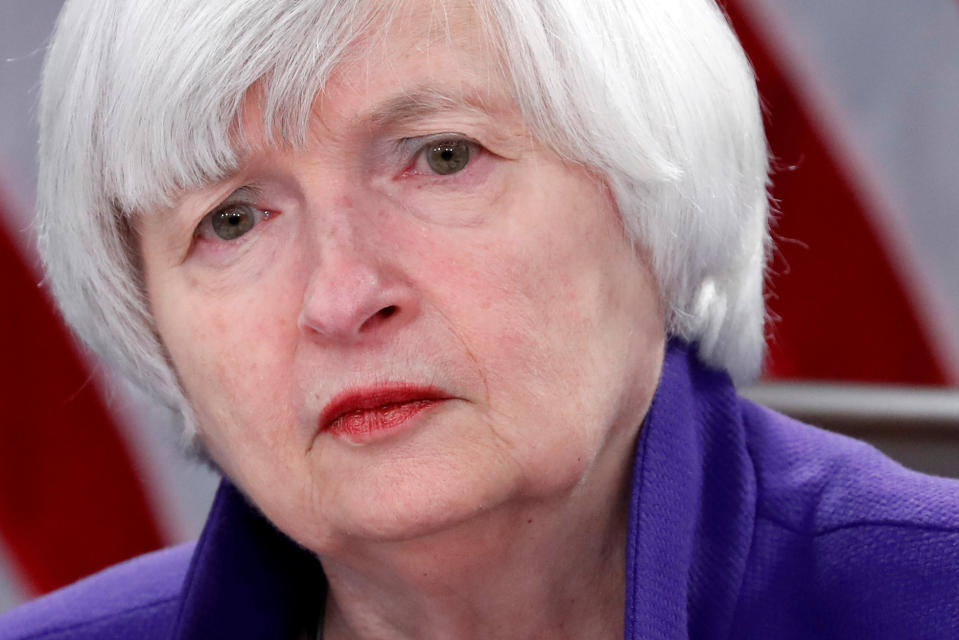Leveraged loan growth sparks concerns about the next financial crisis
Former Fed Chair Janet Yellen and other big names in the financial regulatory space are expressing concern over the systemic risk of leveraged loans.
Lenders will originate leveraged loans to companies looking to finance large transactions, such as a merger. Those lenders then bundle those loans into collateralized loan obligations, which are shopped and traded among investors as securities.
Yellen recently told the Financial Times that she has seen a “huge deterioration” in lending standards in the $1.3 trillion market for leveraged loans, which has only expanded since the financial crisis.
“If we have a downturn in the economy, there are a lot of firms that will go bankrupt, I think, because of this debt,” Yellen said. “It would probably worsen a downturn.”

Yellen is not alone in flagging the leveraged loan market. In a September 2018 paper, the Bank for International Settlements published a report warning that as monetary policy normalizes, floating rates on leveraged loans could worsen borrowers’ debt coverage ratios and decrease the amount of loan recovery rates in the event of a downturn.
Collateralized loan obligations, once seen as an attractive source of yield in a low-rate environment, have also seen their spreads tighten as the Fed steadily raises rates.
An August report from Moody’s said that leveraged finance is also suffering from deteriorating credit quality. Moody’s added that leveraged loan recoveries would likely fall to 61% during the next downturn, compared to the average recovery rate of 77%, citing a growth in the number of lower-rated borrowers and changing preferences for leveraged loans over high-yield bonds.

“This structural convergence between bonds and loans will have negative consequences for investors, including worse recoveries, when the markets turn,” Moody’s wrote.
Worse recoveries = systemic risk?
The Loan Syndications and Trading Association, an advocate group for leveraged loans, points out that collateralized loan obligations rated AA-rated or better have never defaulted, even during the crisis.
“People are jumping to conclusions by focusing on credit risk but not looking at much lower systemic risk, which does not support those conclusions,” Elliot Ganz, general counsel of the LSTA, told Yahoo Finance.
And even though the securitized structure for leveraged lending resembles the mortgage-backed securities model that contributed to the 2008 crisis, collateralized loan obligations and their underlying leveraged loans are high-risk by nature, meaning that investors are generally aware of the default risk they are signing up for.
Shawn Thomas, a professor of finance at the University of Pittsburgh, said regulators should still keep a close eye on leveraged loans.
“From a regulatory standpoint these are the loans that are most worth monitoring and scrutinizing because we know if there is a downturn, the most leveraged companies are the most fragile and the ones that face distress the soonest,” Thomas said.
In 2013, Yellen and the two other bank regulators issued guidance that discouraged banks from underwriting loans with more than six times debt-to-EBITDA (earnings before interest, tax, depreciation, and amortization).
But the Trump-appointed bank regulators have indicated interest in rescinding that numerical guideline. Comptroller of the Currency Joseph Otting said banks can “do what they want” with regard to leveraged lending, as long as they have sufficient capital. The Jerome Powell-led Fed has still expressed some interest in watching leveraged lending, Bloomberg reported.
For her part, Yellen told the FT that she is worried about the changing attitude to broad financial regulation.
“There are a lot of weaknesses in the system, and instead of looking to remedy those weaknesses I feel things have turned in a very deregulatory direction,” Yellen said.
Brian Cheung is a reporter covering the banking industry and the intersection of finance and policy for Yahoo Finance. You can follow him on Twitter @bcheungz.
Read more:
A single word reveals how the Fed is thinking about the market rout
Fed Vice Chair Quarles prefers ‘more gradual’ rate hikes
Prudential Financial to shed its post-crisis ‘too big to fail’ label
